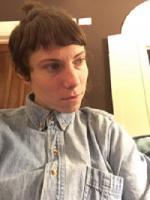Foster, Ellen

Fellow at IAS-STS: 2017/2018 and 2016/17
Ellen K Foster is a doctoral candidate in the department of Science and Technology Studies at Rensselaer Polytechnic Institute in Troy, NY USA. She completed her undergraduate studies at Vassar College, where she received a BA in Physics and Astronomy. Prior to starting her graduate degree, Foster held several positions including as a clinical research coordinator at the University of Pennsylvania, and as a research assistant for the Chemical Heritage Foundation. Her current research focuses on maker and hacker cultures, examining themes of accessibility, empowerment, inclusion, and exclusion in both the discourse and material praxis of different maker communities. Foster is exploring feminist epistemologies and critical pedagogies as a helpful theoretical lens through which to analyse the work of these groups, which will be a main focus of her work at the Institute for Advanced Study in Graz. At the beginning of her graduate studies, she explored the potentials for Culturally Situated Design Tools (CSDTs) with Dr. Ron Eglash in a K-12 public school classroom setting, particularly project-based learning experiences using e-waste, simple Arduino kits, simple circuitry, and maker educational practices. She has presented her work at the DIY Subversive Knowledges Conference in Marburg, Germany, the Interruptions: Sciences, Feminisms, Knowledges Conference at UC Berkeley, as well as at annual meetings for the Society of the Social Studies of Science (4S), Society for the History of Technology (SHOT), and the Gender Bodies and Technology conference convened by Virginia Tech.
Project at IAS-STS: Socio-material Practices in the ‘Maker Movement’: Feminist Hackers, the Fixers Collective, Library Makerspaces and the Politics of Inclusion
This dissertation project aims to give an in-depth characterization of maker and hacker collectivities that are invested in exploring intersections of marginalization, technological innovation, development, and use – particularly in regard to gender, race, class and disability. Makerspaces and hackerspaces are places where like-minded individuals come together to share space, tools, skills and/or communal interests, with a typically technological focus. I am interested in examining how these groups are intervening into technologies and the structures that produce and sustain them – as well as how they sustain and ground their own practices. I am exploring in what ways they do, or at least hope to, disrupt the reproduction of hegemonic practices in regards to technological use and production. I am further interested in how I might contribute to these interventions by unpacking the skill-sharing and pedagogical practices associated with makerspaces and at these sites of intervention in particular. This unpacking and deeper examination of workshops and skill-shares is the particular part of my project I hope to enact while in the IAS-STS program in Graz, in conjunction with a deep analysis of my aggregate interview data. I hope to get further feedback on how pedagogical practices are enacted in the sharing of skills – how their structuration destabilizes or reinforces hegemonic and dominant thinking in terms of technical and scientific skills.
Selected Publications
“On the Politics of Generative Justice: African Traditions and Maker Communities” In What Do Science, Technology and Innovation Mean from Africa, MIT Press (Expected April 2017)
“Critical Work shopping: The Contact Microphone” In Hyperrhiz: New Media Cultures 13 (2015)
“Broadening Participation: Toward Culturally Responsive Computing Education” In Communications of the ACM. 56 (2013): 1-4.7.
